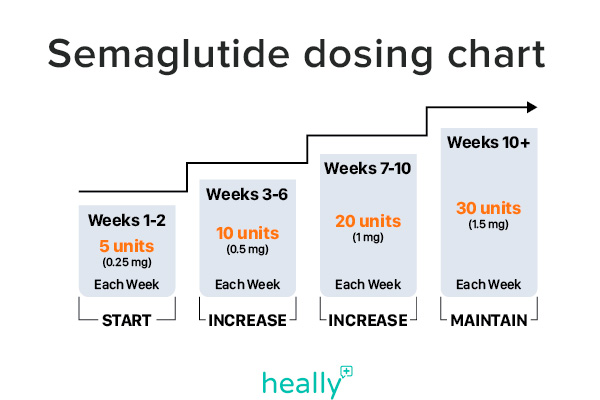Semaglutide is one of the most effective prescription medications for weight management today. As a GLP-1 receptor agonist, it works by mimicking the body’s natural hormones that regulate appetite, blood sugar, and digestion.
To make semaglutide treatment both safe and effective, it’s essential to follow proper dosing and titration guidelines. This comprehensive dosing guide explains how to start, increase, and maintain semaglutide dosage for weight loss—whether you’re using injectable or oral forms.
Active Ingredient: Semaglutide
Semaglutide activates glucagon-like peptide-1 (GLP-1) receptors, helping control appetite, slow gastric emptying, and regulate blood sugar. The result: reduced calorie intake and improved satiety, which lead to sustained weight loss.
Semaglutide is available in three FDA-approved formulations:
| Brand Name | Manufacturer | Route | FDA-Approved Use | FDA Approval Year |
|---|---|---|---|---|
| Ozempic | Novo Nordisk | Injectable (weekly) | Type 2 diabetes; Cardiovascular risk reduction | 2017 |
| Wegovy | Novo Nordisk | Injectable (weekly) | Chronic weight management | 2021 |
| Rybelsus (oral) | Novo Nordisk | Oral Tablet (daily tablet) | Type 2 diabetes | 2019 |
Throughout this article, any reference to semaglutide for weight loss refers to Wegovy. Mentions of semaglutide for blood sugar control refer to Ozempic.
Semaglutide dosing chart
The semaglutide dosing chart shows a gradual, step-by-step increase designed to help the body adjust smoothly. It starts with a low weekly dose during the first two weeks, then moves into a moderate range through weeks three to six, followed by another increase in weeks seven to ten. After that, the semaglutide dosage chart reaches its long-term maintenance level, which remains steady from week ten onward. This semaglutide weight loss dosage chart highlights how the medication is typically titrated to balance effectiveness with tolerability, and the overall semaglutide dose chart visually reinforces this controlled, progressive ramp-up.

What Is the Semaglutide Starting Dose for Weight Loss?
The starting dose of semaglutide for weight loss is 0.25 mg once weekly for four weeks.
This low dose minimizes gastrointestinal side effects and allows your body to adjust gradually.
For oral semaglutide (Rybelsus), the starting dose is 3 mg once daily for 30 days, followed by a stepwise increase to 7 mg and then 14 mg daily as tolerated.
Key points:
-
Always begin with the lowest available dose.
-
Your healthcare provider will assess tolerance before increasing the dose.
-
Never skip directly to a higher strength; titration prevents nausea and other GI symptoms.
What Is the Maximum Dose of Semaglutide for Weight Loss?
The maximum semaglutide dose for weight loss depends on the formulation:
-
Wegovy: up to 2.4 mg once weekly injection (maintenance dose).
-
Ozempic: up to 2.0 mg once weekly injection (for diabetes; sometimes used off-label for weight loss).
-
Rybelsus (oral):
Not all patients will need or tolerate the maximum dose. Your provider will determine when to stop dose escalation based on your side effects, weight loss rate, and metabolic response.
What Is Semaglutide Dose Titration and Why Is It Important?
Titration refers to the gradual increase in medication dosage over time. For semaglutide, this slow escalation is critical for safety and tolerability.
Semaglutide works by altering digestion and appetite signaling—mechanisms that can cause nausea, bloating, or constipation if the dose is increased too quickly.
Proper titration ensures:
-
Better tolerance: fewer GI side effects.
-
Sustained results: steady weight loss without treatment interruption.
-
Optimized safety: prevents overdosing and hypoglycemia-like symptoms.
Semaglutide Titration Chart
Below is the standard semaglutide weight loss dosing schedule, also referred to as the semaglutide titration schedule.
| Weeks | Weekly Injection Dose | Purpose |
|---|---|---|
| 1–4 | 0.25 mg | Starting dose for tolerance |
| 5–8 | 0.5 mg | Step-up phase |
| 9–12 | 1.0 mg | Continued escalation |
| 13–16 | 1.7 mg | Near-target phase |
| 17+ | 2.4 mg | Maintenance dose |
For oral semaglutide (Rybelsus), the equivalent titration schedule is:
-
3 mg once daily (first month) → 7 mg once daily → 14 mg once daily (maintenance).
How to Establish a Consistent Semaglutide Schedule
Consistency is essential to maintain stable hormone levels.
-
Inject semaglutide on the same day each week (e.g., every Monday morning).
-
You can inject with or without food, at any time of day.
-
For oral Rybelsus: take the tablet on an empty stomach with a small sip of water and wait at least 30 minutes before eating or drinking anything else.
-
Set reminders or calendar alerts to stay on track.
Skipping doses or changing timing may reduce effectiveness and increase side effects.
Semaglutide Dosing Safety and Side Effects
Semaglutide’s gradual dosing schedule is designed for safety.
Common side effects include:
-
Nausea and vomiting: often temporary and improve after dose stabilization.
-
Constipation or diarrhea: managed with hydration and dietary fiber.
-
Abdominal pain or bloating.
-
Decreased appetite or early fullness.
-
Mild headache or fatigue.
Serious but rare effects:
-
Pancreatitis
-
Gallbladder disease
-
Vision changes in patients with diabetes
-
Kidney injury from dehydration
-
Thyroid C-cell tumors (see boxed warning)
Semaglutide Overdose
An overdose may mimic hypoglycemia symptoms, even without low blood sugar.
Watch for:
-
Dizziness or confusion
-
Nausea, vomiting, or abdominal pain
-
Tremors, weakness, or irritability
-
Fainting or loss of consciousness
If overdose is suspected, seek immediate medical attention or call 911.
How to Adapt the Semaglutide Dose to Individual Needs
The optimal semaglutide dosage for weight loss varies based on:
-
Current weight and BMI
-
Age and metabolic rate
-
Pre-existing conditions (like diabetes or kidney disease)
-
Medication tolerance and side effects
-
Lifestyle factors such as diet and activity level
Clinicians may adjust your titration speed or maintenance dose to match your body’s response. The goal is to achieve effective, sustainable weight loss while minimizing adverse effects.
Stay Safe with Proper Semaglutide Dosing for Weight Loss
Semaglutide can deliver transformative results—but only when used correctly.
Never accelerate your dosing schedule without medical guidance. Doing so increases the risk of side effects and overdose.
Partner with a licensed healthcare provider to:
-
Establish a personalized dosing plan.
-
Monitor your progress and adjust as needed.
-
Learn proper injection technique and timing.
Heally’s telehealth specialists can prescribe semaglutide online, guide your dose titration, and ensure your treatment remains safe and effective.
Conclusion
Understanding semaglutide dosing is key to a safe and successful weight loss journey.
Starting at 0.25 mg weekly and titrating slowly to 2.4 mg allows your body to adapt and your results to stabilize.
Whether you use injectable or oral semaglutide, consistency and professional oversight are essential.
Heally can connect you to a knowledgeable doctor who can help you find the best way forward with Semaglutide. You don’t have to navigate this alone; let’s find the right solution together, schedule your free consultation with Heally today!
Sources
- NIH: Semaglutide StatPearls
- New England Journal of Medicine – STEP 1 Trial: Once‑Weekly Semaglutide for Weight Loss
- Nature – Two-Year Effects of Semaglutide (STEP 5 Trial)
- FDA Alert – Overdose Risks from Semaglutide and Other GLP-1 Agonists
- WEGOVY – Wegovy Dosing Schedule
- Drugs: Rybelsus Dosage
- Ozempic: A Once Weekly Dosing Schedule
- FDA Label: OZEMPIC (Semaglutide Injection) Medication Guide
- FDA Label: WEGOVY (Semaglutide Injection) Medication Guide
- FDA Label: RYBELSUS (Oral Semaglutide) Medication Guide
- FDA Label: MOUNJARO (Tirzepatide Injection) Medication Guide
- FDA Label: ZEPBOUND (Tirzepatide Injection) Medication Guide
Important Medical Information and Disclaimers
MEDICAL DISCLAIMER
This information is for educational purposes only and is not intended as medical advice, diagnosis, or treatment recommendation. Semaglutide is the active ingredient in three FDA-approved prescription medications: Ozempic and Rybelsus, approved for improving blood sugar control in adults with type 2 diabetes, and Wegovy, approved for chronic weight management in adults with obesity or overweight who have at least one weight-related medical condition. Although these medications contain semaglutide, they are approved for different uses and have different dosing schedules. Always consult a qualified healthcare provider before starting, stopping, or changing any treatment plan.
INDIVIDUAL RESULTS VARY
Outcomes with semaglutide treatment vary from person to person. Clinical trial data may not reflect typical real-world experiences. A variety of factors can affect your results, including medication adherence, lifestyle habits such as diet and exercise, metabolic differences, other health conditions, and concurrent medications. No specific result is guaranteed.
IMPORTANT SAFETY INFORMATION
Common side effects of semaglutide may include: Nausea, Vomiting, Diarrhea, Constipation, Stomach pain, Decreased appetite, Indigestion, Belching or gas, Injection site reactions
These side effects are often mild and may lessen over time. Always inform your healthcare provider about any medical conditions, allergies, and all medications you are currently taking before starting semaglutide. Ongoing monitoring is recommended during treatment.
WARNING: Semaglutide has a boxed warning about the potential risk of thyroid C-cell tumors. Do not use this medication if you or a family member has a history of medullary thyroid carcinoma (MTC) or Multiple Endocrine Neoplasia syndrome type 2 (MEN 2).
FDA ADVERSE EVENT REPORTING
You are encouraged to report negative side effects of prescription drugs to the U.S. Food and Drug Administration (FDA).
Visit www.fda.gov/medwatch or call 1-800-FDA-1088.
Adverse events may also be reported directly to the manufacturer.

